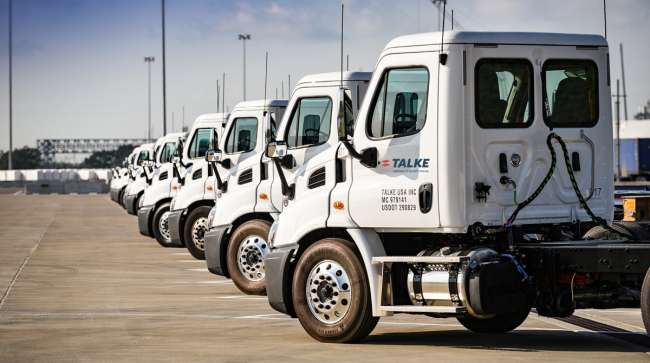Transitioning to Hydrogen in Heavy-Duty Freight Transport
Talke USA is paving the way toward sustainable logistics by retrofitting Freightliner drayage tractors with hydrogen fuel cell powertrains developed by Symbio North America. This bold step involves transforming two Freightliner Cascadias with these cutting-edge systems, with plans to potentially scale up to 20 trucks if initial testing proves successful.
Why Hydrogen? The Edge Over Battery Electric Vehicles
The decision to embrace hydrogen fuel cells over battery-electric options comes down to operational practicality and weight considerations. Talke operates a fleet of 120 drayage units across North America—all Freightliners—and managing vehicle weight is critical for maximizing cargo capacity. Battery-electric trucks, while zero-emission, tend to be heavier, which could limit payload efficiency for Talke’s demanding port-to-facility runs. Hydrogen fuel cells offer a lighter alternative with a cleaner energy profile, aligning with Talke’s long-term sustainability vision.
Hydrogen Types and Environmental Impact
- Blue Hydrogen: Initially, Talke will use blue hydrogen, which is produced from natural gas with carbon capture technologies to reduce emissions.
- Green Hydrogen: The company hopes to transition to green hydrogen in the future, produced via water electrolysis powered by renewable energy, promising a truly carbon-neutral solution.
- Gray Hydrogen: This type, though the most accessible, releases carbon dioxide into the atmosphere and is less desirable from an environmental standpoint.
Operational Plans
The two hydrogen-powered Freightliner Cascadias will primarily serve the Houston area, conducting two to three daily drayage trips between the Port of Houston and nearby facilities. Each truck is anticipated to cover between 300 and 350 miles per day, a range well-suited to Talke’s localized logistics needs.
| Funkcia | Podrobnosti na |
|---|---|
| Model | Freightliner Cascadia |
| Powertrain | Symbio hydrogen fuel cell |
| Number of Trucks Initially Upfitted | 2 |
| Potential Fleet Expansion | Up to 20 trucks |
| Daily Range per Truck | 300–350 miles |
| Primary Use | Drayage operations in Houston |
Tackling Sustainability in Logistics: Challenges and Opportunities
Talke’s adoption of hydrogen fuel cell technology reflects a broader industry push to reduce emissions in freight haulage. As a chemical industry logistics specialist, their role is key in promoting sustainable transportation choices that are both commercially viable and operationally effective.
Despite the promise, hydrogen technology has faced hurdles, including limited early adoption and market volatility. Talke itself tested fuel cell trucks from Hyzon in 2024 before settling on Symbio after a comprehensive two-year evaluation. This cautious approach highlights the complexity of balancing new tech adoption with the reliability logistics demands.
Geographical and Supply Chain Advantages
One factor working in Talke’s favor is their operational base near Houston’s robust refining and petrochemical infrastructure—part of the Texas and Louisiana Gulf Coast. This proximity ensures a stable supply of hydrogen, including access to a Department of Energy hydrogen hub, reducing logistics complications around fuel sourcing.
Industry Context: Symbio’s Growing Presence in Heavy Transport
Talke joins a select group of early adopters working with Symbio, who showcased its hydrogen fuel cell powertrain alongside a demonstration tractor at the 2024 Advanced Clean Transportation Expo. Another notable partner is Savage Companies, which plans to upfit its own drayage fleet with Symbio systems, underlining the technology’s widening acceptance within specialized freight sectors.
Looking Ahead: What This Means for Freight and Logistics
Hydrogen-powered trucks are still finding their footing in the freight transport ecosystem. However, Talke’s move indicates a growing confidence in fuel cell solutions as logistics providers seek to responsibly manage environmental impact without compromising on operational capacity.
The potential benefits of hydrogen in logistics are sizable: lighter vehicle weight compared to battery electric, quick refueling capability, and decent range for daily regional routes. These characteristics suit the needs of drayage operators, warehouse-to-port haulers, and other short to medium-haul freight services.
Summary Table: Hydrogen Trucks vs Battery-Electric
| Aspekt | Hydrogen Fuel Cell Trucks | Battery-Electric Trucks |
|---|---|---|
| Vehicle Weight | Lighter relative to batteries | Heavier due to battery packs |
| Refueling Time | Minutes (similar to diesel) | Hours |
| Rozsah | 300–350 miles typical | Varies but often less for heavy loads |
| Environmental Footprint | Depends on hydrogen source (blue, green) | Zero tailpipe emissions |
The Human Element: Why Experience Matters
Of course, no matter how glowing the reviews or the data supporting hydrogen’s promise, nothing replaces firsthand experience. Talke’s practical trials and phased approach demonstrate this well, underscoring the importance of real-world testing in demanding logistics conditions before scaling.
For shippers, freight forwarders, and logistics planners, platforms like GetTransport.com offer a practical bridge between innovative transport options and reliable service delivery. Whether it’s moving office equipment, shifting bulky freight, or handling vehicles and furniture, GetTransport.com connects users to affordable, global haulage and shipping solutions, helping navigate the evolving market toward sustainable freight.
GetTransport.com empowers logistics professionals and everyday users alike to arrange cargo transportation at competitive prices worldwide. Its transparent booking system facilitates informed choices without hidden costs or surprises, perfectly suited for adapting to emerging transport technologies and needs. Rezervujte si jazdu na GetTransport.com.
Conclusion: Steering Logistics Toward a Hydrogen Future
Talke USA’s initiative to upfit Freightliner drayage tractors with Symbio hydrogen fuel cell powertrains marks a significant stride towards cleaner, more efficient freight movement. Leveraging hydrogen’s advantages—light vehicle weight and operational range tailored to regional logistics—demonstrates a promising path for sustainable transport.
This approach blends innovation with operational reliability, crucial for logistics chains that demand both. The evolving hydrogen infrastructure near Houston supports this transition, with anticipated expansion reflecting a broader industry shift.
As the freight and shipping sectors embrace hydrogen and other cleaner alternatives, platforms like GetTransport.com stand ready to facilitate these changes by providing seamless, cost-effective access to diverse cargo transportation options. This synergy ensures logistics remain resilient, adaptable, and environmentally conscious for years to come.

 Talke USA Integrates Hydrogen Fuel Cell Powertrains into Freightliner Drayage Trucks for Greener Logistics">
Talke USA Integrates Hydrogen Fuel Cell Powertrains into Freightliner Drayage Trucks for Greener Logistics">